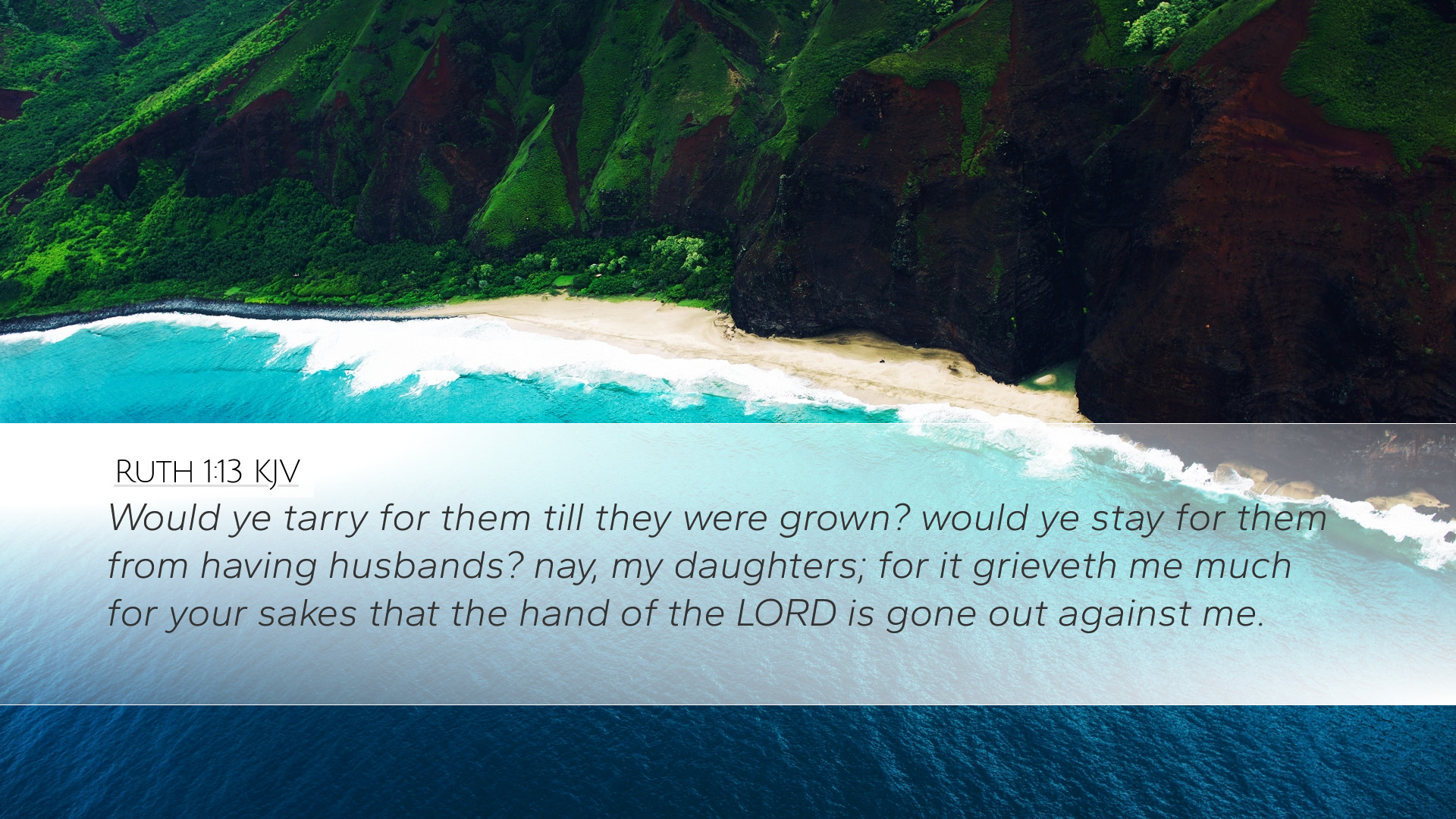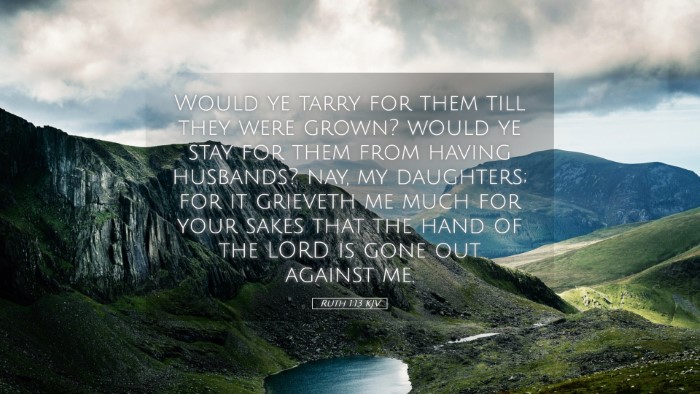Old Testament
Genesis Exodus Leviticus Numbers Deuteronomy Joshua Judges Ruth 1 Samuel 2 Samuel 1 Kings 2 Kings 1 Chronicles 2 Chronicles Ezra Nehemiah Esther Job Psalms Proverbs Ecclesiastes Song of Solomon Isaiah Jeremiah Lamentations Ezekiel Daniel Hosea Joel Amos Obadiah Jonah Micah Nahum Habakkuk Zephaniah Haggai Zechariah MalachiRuth 1:13
Ruth 1:13 KJV
Would ye tarry for them till they were grown? would ye stay for them from having husbands? nay, my daughters; for it grieveth me much for your sakes that the hand of the LORD is gone out against me.
Ruth 1:13 Bible Commentary
Commentary on Ruth 1:13
Verse Context: Ruth 1:13 states, "Would you therefore wait until they were grown? Would you restrain yourselves from having husbands? No, my daughters; for it grieves me very much for your sakes that the hand of the LORD has gone out against me."
1. Overview of the Passage
This verse is spoken by Naomi as she expresses her deep sorrow over her situation and the plight of her daughters-in-law, Ruth and Orpah. The context of this passage involves a poignant moment in which Naomi urges her daughters-in-law to return to their families in Moab after the death of their husbands. The emotional weight of Naomi’s words reveals not only her concern for their welfare but also her sense of profound loss and abandonment.
2. Insights from Matthew Henry
- Heartfelt Concern: Matthew Henry emphasizes that Naomi's words reflect a genuine maternal concern for Ruth and Orpah. She recognizes that her daughters-in-law are at a crossroads and feels responsible for their eventual fate.
- Theological Implications: Henry points out that Naomi's phrase "the hand of the LORD has gone out against me" is a reflection of her belief in God’s providence, acknowledging that her misfortunes are permitted by God. It conveys both a sense of accountability and a deep-seated sorrow for her perceived suffering.
- Character of Naomi: He describes Naomi as a woman of integrity who, despite her despair, seeks the best for her daughters-in-law. Her desire for them to find new husbands signifies her love and hope for their happiness.
3. Reflections by Albert Barnes
- Cultural Context: Barnes provides context regarding the cultural practices surrounding marriage in ancient Israel. He notes that Naomi's suggestion for her daughters to wait for her to bear more sons is a reflection of the levirate marriage custom, which highlights the significance of family ties and roles in their society.
- Emotional Tone: He also notes the deep emotional burden borne by Naomi. Her statement indicates her understanding that her daughters have no real future with her, which implicitly challenges the reader to consider the impact of loss and the importance of familial loyalty.
- God's Sovereignty: Barnes stresses that while Naomi feels abandoned, her acknowledgment of God’s hand indicates a theological depth that recognizes God’s sovereignty even amid suffering. This recognition becomes a foundation for hope despite her bleak circumstances.
4. Analysis by Adam Clarke
- Naomi's Grief: Clarke elaborates on Naomi's grief, noting that she perceives herself as a source of suffering for her daughters-in-law. Her profound compassion for Ruth and Orpah highlights her selflessness in their well-being rather than her own.
- Spiritual Dynamics: Clarke examines the spiritual dynamics at play, contemplating how Naomi's trials serve as a backdrop to God's larger plan for redemption and providence. He implies that while suffering appears central in this moment, it can also serve as a precursor to God's grace and restoration.
- Lessons in Decision-Making: He posits that Naomi’s decision to release her daughters holds practical wisdom for contemporary readers about making decisions that bear witness to love and faith, encouraging believers to discern the paths God lays out for them.
5. Theological Themes
- God's Providence: The verse acts as a reminder of God's providential workings even in the shadows of grief. It asserts that God’s hand, while sometimes felt as a burden, ultimately aligns with His redemptive purposes.
- Human Relationships: The interaction between Naomi and her daughters-in-law illustrates the complexity of human relationships, where love often involves sacrifice and difficult choices. It calls into question how believers might navigate similar situations today.
- Hope amid Suffering: The moment of grief expressed by Naomi serves as a place of deep reflection on hope. This passage prompts theologians and scholars to contemplate how suffering can be redemptive when woven into the fabric of God’s overarching narrative.
6. Application for Pastors and Leaders
- Empathy in Ministry: Pastors can draw from Naomi’s compassionate resolve. Understanding the struggles of congregants calls for an empathetic approach that places their needs ahead of administrative duties.
- Encouraging Vulnerability: The vulnerability expressed in this passage models the importance of being honest with grief and hardship in ministry without losing sight of God’s faithfulness.
- Fostering Hope: This commentary can encourage church leaders to emphasize the theme of hope rooted in God's providence, teaching that while life may bring sorrow, God’s plan ultimately leads to redemption.


